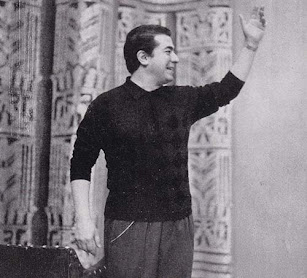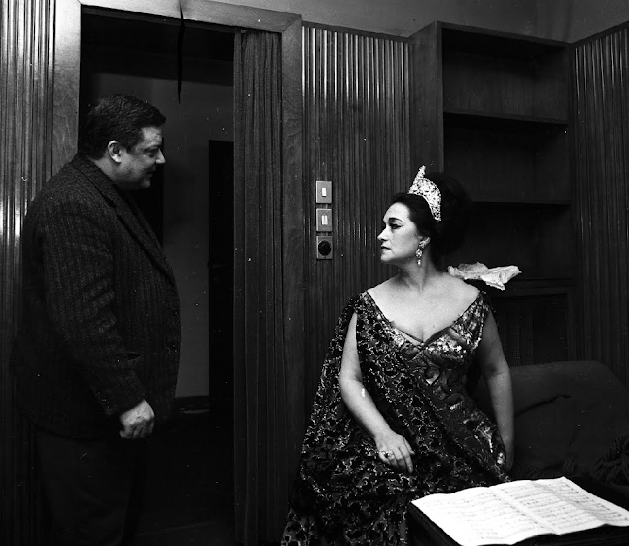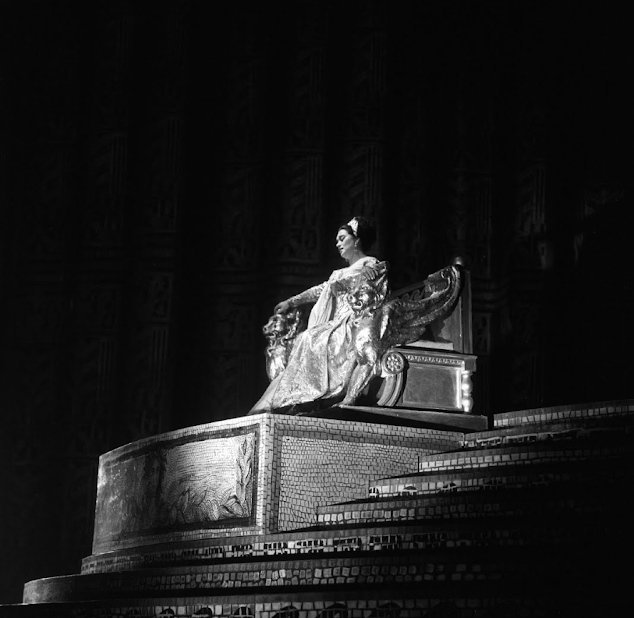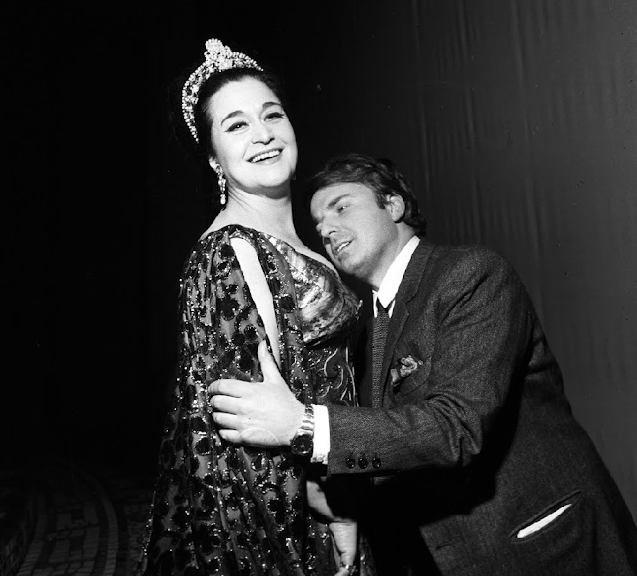Conductor: Bruno Maderna
Chorus master: Roberto Benaglio
Stage director: Margherita Wallmann
Scene and costumes: Attilio Colonnello
Fortuna Goddess of Fortune LAURA RONDI mezzosoprano
Chorus master: Roberto Benaglio
Stage director: Margherita Wallmann
Scene and costumes: Attilio Colonnello
Fortuna Goddess of Fortune LAURA RONDI mezzosoprano
Virtu Goddess of Virtue EMMA RENZI soprano
Amore Goddess of Love EDITH MARTELLI soprano
Ottone Poppea’s former lover ALBERO RINALDI baritone
A soldier of the Emperor’s Bodyguard PIERRO DI PALMA tenor
A soldier of the Emperor’s Bodyguard MARIO CARLIN tenor
Poppea GRACE BUMBRY mezzosoprano
Nerone Emperor of Rome RENATO GAVARINI/GIUSEPPE DI STEFANO (27, 30) tenor
Arnalta Poppea’s old nurse GLORIA LANE soprano
Ottavia Empress of Rome LEYLA GENCER soprano [Role debut]
Nutrice Ottavia’s nurse MARIA MADDALENA mezzosoprano
Durusilla Ottavia’s lady-in waiting ANNA NOVELLI soprano
Seneca philosopher, Nerone’s former tutor CARLO CAVA bass baritone
Damigella Octavia’s maid MADDALENA BONIFACCIO soprano
Liberto Captain of the Guard LORENZO TESTI baritone
Pallade Goddess of Wisdom MIRELLA FIORENTINI soprano
Lucano Nero’s Friend WALTER BRIGHI tenor
Littore MIRELLA GIACOMOTTI bass
Mercurio REGOLO ROMANI tenor
Valetto MARIA CASULA mezzosoprano
Petroni ANGELO MERCURIALI tenor
Tigellino: LEONARDO MONREALE bass/JEDA VALTRIANI soprano/PIO BONFANTI, tenor
Time: About 55 AD
Place: Rome
† Recording date
Amore Goddess of Love EDITH MARTELLI soprano
Ottone Poppea’s former lover ALBERO RINALDI baritone
A soldier of the Emperor’s Bodyguard PIERRO DI PALMA tenor
A soldier of the Emperor’s Bodyguard MARIO CARLIN tenor
Poppea GRACE BUMBRY mezzosoprano
Nerone Emperor of Rome RENATO GAVARINI/GIUSEPPE DI STEFANO (27, 30) tenor
Arnalta Poppea’s old nurse GLORIA LANE soprano
Ottavia Empress of Rome LEYLA GENCER soprano [Role debut]
Nutrice Ottavia’s nurse MARIA MADDALENA mezzosoprano
Durusilla Ottavia’s lady-in waiting ANNA NOVELLI soprano
Seneca philosopher, Nerone’s former tutor CARLO CAVA bass baritone
Damigella Octavia’s maid MADDALENA BONIFACCIO soprano
Liberto Captain of the Guard LORENZO TESTI baritone
Pallade Goddess of Wisdom MIRELLA FIORENTINI soprano
Lucano Nero’s Friend WALTER BRIGHI tenor
Littore MIRELLA GIACOMOTTI bass
Mercurio REGOLO ROMANI tenor
Valetto MARIA CASULA mezzosoprano
Petroni ANGELO MERCURIALI tenor
Tigellino: LEONARDO MONREALE bass/JEDA VALTRIANI soprano/PIO BONFANTI, tenor
Time: About 55 AD
Place: Rome
† Recording date
Photos © ERIO PICCAGLIANI, Milano
Sketches © ATTILIO COLONELLO
GENCER ALLA SCALA
L'INCORONAZIONE DI POPPEA
STAGIONE 1966 – 1967


AVANTI
1967.01.12
L'UNITA
1967.01.14
THE KANSAS CITY TIMES
1967.01.16
OPERA FRESH
2014.07.07
Leyla Gencer And Grace Bumbry In Unconventional Performance
 |
Grace
Bumbry (left) and Leyla Gencer (right) appear backstage during performances of
Monteverdi's L'incoronazione di Poppea at La Scala in 1967.
Photo
© Erio Piccagliani, Milano |
http://operafresh.blogspot.com/2014/06/leyla-gencer-and-grace-bumbry-in.html
HIGHLIGHTS
1967.01.27
Recording Excerpts [1967.01.27]
Addio Roma, addio patria Act II Scene VI
Tu che dagli avi miei Act II Scene IX
FROM CD BOOKLET
L'INCORANAZIONE DI POPPEA
The present version of "L'incoronazione di Poppea" dates from 1937 and was prepared by Giacomo Benvenuti. Benvenuti was born on March 16, 1885, in Brescia and died on January 20, 1943, in Barbarano di Salò. He studied composition at the Liceo Musicale in Bologna, soon being closely associated with the circle around Ottorino Respighi and Riccardo Bacchelli. In 1908 the conductor Willem Mengelberg came across some of his piano compositions and was sufficiently impressed to recommend them to the pianist Eugen d'Albert who, in turn, recommended Benvenuti to the Music Publishers Schott as a staff member. In 1912 Benvenuti won a competition with performed more than sixty times that year, throughout Europe. Benvenuti also wrote an opera: "Don Juan José" which has, however, neither been published or indeed performed.
Eventually he concentrated wholly on the reconstruction of performing versions of old Italian music, preparing the first editions of symphonies and sonatas by Sammartini, the toccatas by Frescobaldi as well as compositions by Cavazzoni. In 1934 he arranged Monteverdi's "Orfeo" for performance. Benvenuti's version of "L'incoronazione di Poppea" was first performed in Florence on June 6, 1937, conducted by Gino Marinuzzi. Monteverdi performances are extremely rare at La Scala. In fact, apart from a performance of "Orfeo" in 1935 conducted by Gino Marinuzzi with Carlo Galeffi as Orfeo, up until 1967 there had only been one performance of "Poppea"; in 1953. The conductor was Carlo Maria Giulini and the cast headed by Clara Petrella as Poppea, Renato Gavarini as Nero and Maria Radev as Ottavia. On January 13, 1967, La Scala decided to mount the opera again in honour of the 400th anniversary of Monteverdi's birth. Giuseppe Di Stefano fell ill before the premiere and Renato Gavarini was a last- minute substitute. We have therefore decided to issue the recording made during the dress rehearsal. However, there was a mishap here too. During the performance Leyla Gencer stumbled and injured herself severely enough to require hospital treatment. Her cover took over for the remainder of the performance.
The press was generally luke-warm about the performance. OPERA wrote that it "is sad that one of the loveliest operas in the repertory cannot find a way to win the hearts (or even the ears) of the Scala patrons."
While "authentic" style adherents will consider the present performance as dating from something like the Stone Age of musicological research, and no-one nowadays would seriously consider Grace Bumbry, Giuseppe Di Stefano and Leyla Gencer suitable exponents of early Italian Baroque style, it's fun to think that they ever were. Yet some of the sheer lustiness of their approach might not come amiss in the - so often vocally effete - performances so much in favour at present. Should this performance require additional defence, it might be apposite to recall Raymond Leppard's statement: "There will and should be endless interpretation of the details of reconstruction. No one version will be wholly right or wholly wrong. Like Shakespeare, Monteverdi's quality will shine through the worst and the best we can do for him."
Bruno Maderna was born in 1920 in Venice. He studied composition with Gian Francesco Malipiero and conducting with Herman Scherchen. He eventually became the senior member of the new, post- war generation of Italian serialist composers, whose other exponents included Luciano Berio and Luigi Nono. His compositional procedures were based on careful mathematical calculations of the series for each composition. From the basic material, by the manipulation of dynamics and of the pitch of the various notes of the series, he derived surprisingly lyrical music. His compositions include "Compositions in three tempi", "Music in two dimensions", for flute and taped sound and a number of compositions for electronic music such as "Dimensions II". Together with Luciano Berio, Maderna was the first Italian musician to take up active research into electronic music. His 'theatre piece' "Satyricon" was first staged at the Holland Festival just a few months before his death in 1973 at the age of 53.
Eventually he concentrated wholly on the reconstruction of performing versions of old Italian music, preparing the first editions of symphonies and sonatas by Sammartini, the toccatas by Frescobaldi as well as compositions by Cavazzoni. In 1934 he arranged Monteverdi's "Orfeo" for performance. Benvenuti's version of "L'incoronazione di Poppea" was first performed in Florence on June 6, 1937, conducted by Gino Marinuzzi. Monteverdi performances are extremely rare at La Scala. In fact, apart from a performance of "Orfeo" in 1935 conducted by Gino Marinuzzi with Carlo Galeffi as Orfeo, up until 1967 there had only been one performance of "Poppea"; in 1953. The conductor was Carlo Maria Giulini and the cast headed by Clara Petrella as Poppea, Renato Gavarini as Nero and Maria Radev as Ottavia. On January 13, 1967, La Scala decided to mount the opera again in honour of the 400th anniversary of Monteverdi's birth. Giuseppe Di Stefano fell ill before the premiere and Renato Gavarini was a last- minute substitute. We have therefore decided to issue the recording made during the dress rehearsal. However, there was a mishap here too. During the performance Leyla Gencer stumbled and injured herself severely enough to require hospital treatment. Her cover took over for the remainder of the performance.
The press was generally luke-warm about the performance. OPERA wrote that it "is sad that one of the loveliest operas in the repertory cannot find a way to win the hearts (or even the ears) of the Scala patrons."
While "authentic" style adherents will consider the present performance as dating from something like the Stone Age of musicological research, and no-one nowadays would seriously consider Grace Bumbry, Giuseppe Di Stefano and Leyla Gencer suitable exponents of early Italian Baroque style, it's fun to think that they ever were. Yet some of the sheer lustiness of their approach might not come amiss in the - so often vocally effete - performances so much in favour at present. Should this performance require additional defence, it might be apposite to recall Raymond Leppard's statement: "There will and should be endless interpretation of the details of reconstruction. No one version will be wholly right or wholly wrong. Like Shakespeare, Monteverdi's quality will shine through the worst and the best we can do for him."
Bruno Maderna was born in 1920 in Venice. He studied composition with Gian Francesco Malipiero and conducting with Herman Scherchen. He eventually became the senior member of the new, post- war generation of Italian serialist composers, whose other exponents included Luciano Berio and Luigi Nono. His compositional procedures were based on careful mathematical calculations of the series for each composition. From the basic material, by the manipulation of dynamics and of the pitch of the various notes of the series, he derived surprisingly lyrical music. His compositions include "Compositions in three tempi", "Music in two dimensions", for flute and taped sound and a number of compositions for electronic music such as "Dimensions II". Together with Luciano Berio, Maderna was the first Italian musician to take up active research into electronic music. His 'theatre piece' "Satyricon" was first staged at the Holland Festival just a few months before his death in 1973 at the age of 53.








































































